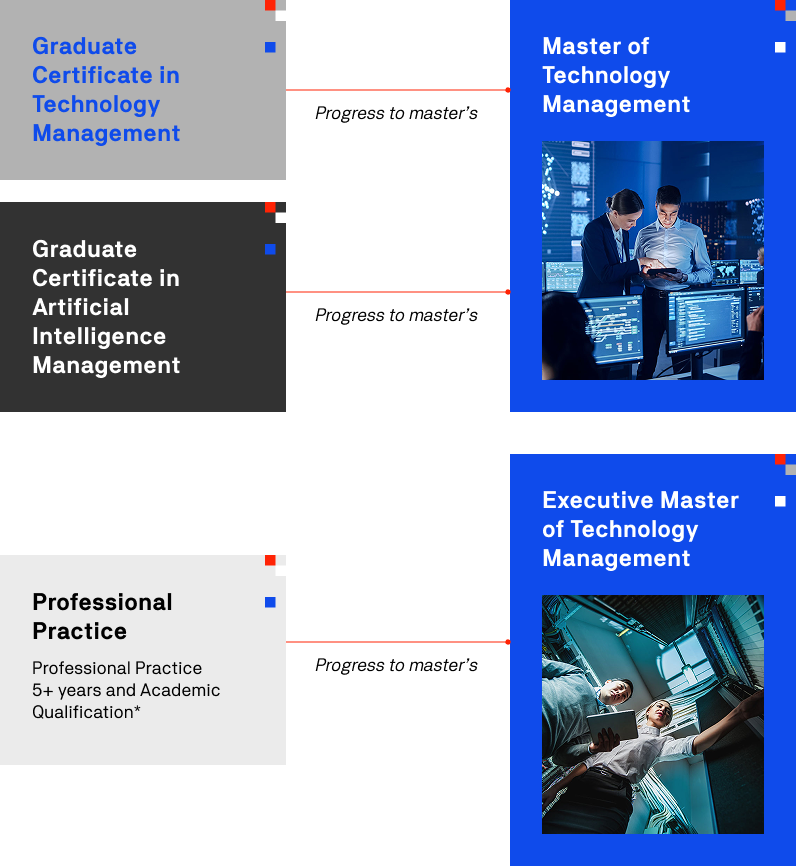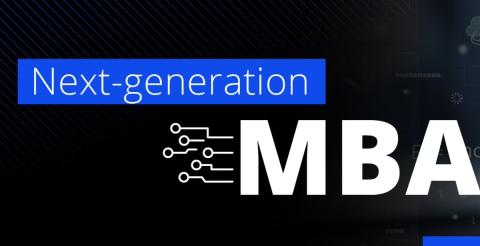Explore our range of 100% online postgraduate courses in Technology and Artificial Intelligence (AI).
UTS Online offers industry-aligned programs designed to advance your career in technology leadership, AI for enterprises, information technology and digital strategy. Whether you're managing complex IT projects, leading digital transformation or developing AI-driven solutions, our technology courses equip you with the expertise needed for your next career move.
Develop the strategic mindset, technical confidence and leadership capability to navigate and influence the future of technology and AI — on your terms, at your own pace.
UTS Online postgraduate courses are available to Australian residents. International applicants are not eligible for a student visa to study UTS Online Technology postgraduate courses.
Technology Management
Why study Technology courses with UTS Online?
#2 in Australia for Computer Science1
Top 100 University Globally2
Top 10 in Australia for graduate employability3
Australia's Top Performing Young University4
1Shanghai Global Ranking of Academic Subjects, 2024 2QS World University Rankings, 2025 3QS Graduate Employability Rankings, 2024 4Times Higher Education Young University Rankings, 2025


Industry-aligned learning with practical applications
Our courses are developed with leading industry experts, giving you practical experience in AI concepts, technology management, IT operations, and modern enterprise frameworks. You’ll learn the latest tools and strategies used across Australia’s fastest-growing technology and AI-enabled sectors.
Connect with network of technology leaders
Join a community of technology professionals, industry leaders and innovators. Build connections across technology management, IT, and emerging fields in artificial intelligence, supporting your future career opportunities.
Specialisations to shape your impact
Focus your studies on technology management, AI in enterprise, or digital strategy, and gain the specialised expertise to advance into leadership roles across Australia’s evolving tech landscape.
Explore our Technology study pathways
Pathway options are available for students who complete a graduate certificate course and wish to progress to the master’s course as well as students who have previous experience in related roles.
These pathways provide flexibility and allow students to tailor their learning experience to their individual needs and interests.
Students who complete the Graduate Certificate in Technology Management or the Graduate Certificate in Artificial Intelligence Management, may qualify to advance to the Master of Technology Management.
Students with the academic qualification required, and a minimum of 5 years professional practice may be eligible for recognition of prior learning (RPL) and could receive up to 4 subjects (24 credit points) of advanced standing towards the Executive Master of Technology Management, reducing the completion time to as little as 16 months.
For personalised pathway advice, speak to a Student Enrolment Advisor.
See Entry Requirements for the Executive Master of Technology Management. Your previous studies or employment experience can be acknowledged as credit towards your online postgraduate studies, provided that it meets the relevant course requirements.
FAQ's about Technology courses at UTS Online
A technology management course combines business strategy and IT, focusing on leading technological innovation, managing IT projects, and understanding how emerging technologies — including AI for enterprises — can support organisational performance.
Yes. Information technology is a fast-growing field offering broad career opportunities. IT skills support roles in cybersecurity, cloud systems, data analytics, AI adoption, digital transformation and IT leadership.
Yes, as organisations increasingly rely on technology, there is a growing demand for professionals who can bridge the gap between technical teams and business objectives. Technology managers are essential for leading digital transformation and ensuring that technological innovations align with organisational goals.
Absolutely. The Graduate Certificate in Technology Management is designed for individuals from diverse professional backgrounds. It provides foundational knowledge in IT, technology leadership and enterprise AI concepts, making it accessible for career changers.
Yes. Tech is one of Australia’s fastest-growing sectors, with more than 1.2 million tech workers projected by 2030. Growth is strong across AI, cybersecurity, cloud, data and digital leadership roles.
Source: Tech Council of Australia, 2024
Graduates may progress into roles such as IT manager, digital transformation lead, technology consultant, solutions architect or CIO. These roles increasingly require the ability to understand AI-enabled systems and align technology strategy with business goals.
Yes. AI skills are becoming essential across most industries, even for professionals without a technical background. Studying an AI course for enterprise can help you understand how AI impacts business operations, automation, decision-making and innovation — making you more competitive in a rapidly evolving job market.
If you're starting out, the Graduate Certificate in Technology Management is an excellent introduction because it includes the subject Artificial Intelligence for Enterprise, designed for professionals without a STEM background.
For those with STEM or IT experience, the Graduate Certificate in Artificial Intelligence Management provides more advanced AI capability.
Enterprise-focused AI skills are highly sought after — particularly in AI integration, automation, data-driven decision-making, and AI-supported business transformation. Industries such as finance, health, government and professional services are rapidly scaling their AI capability.
Technology and AI courses cover areas such as IT fundamentals, digital strategy, technology leadership and enterprise applications of artificial intelligence. You’ll learn how organisations adopt AI, manage technological change and use emerging tools to drive innovation.
Yes. The Technology Management course includes an accessible subject, Artificial Intelligence for Enterprise, which introduces AI concepts without requiring a technical background.













